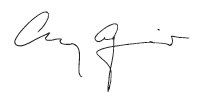My confidence in SAG’s financial leadership team is no secret – I’ve expressed it regularly in these letters and to the Board of Directors. But if there was any skepticism about whether it was warranted, that doubt should be dispelled by the financial results for the fiscal year that closed on April 30, 2010.
First, SAG received the best possible report – an “unqualified opinion” – from auditors Price Waterhouse Coopers for our 2010 Financial Statements. This opinion, the equivalent of an A+, reflects the fact that the auditors found no discrepancies, deficiencies or weaknesses in our internal controls, encountered no difficulties in performing the audit, and offered no adjustments to the statements or recommendations for changes in our financial practices. In other words, we can trust that our finance staff is skilled, honest, and extremely thorough in their management of our resources.
On top of this superlative opinion, the actual results for the year surpassed any expectations. You may recall that, despite strong measures taken after realizing a $6 million deficit in 2009, we assumed that we would continue in a deficit mode for 2010. I am therefore delighted to report that we were able to convert our projected $4 million loss for 2010 into a surplus of over $300,000.
While about a third of this turnaround is due to higher than predicted investment returns from surprisingly strong financial markets, what really made the difference was SAG’s reining in what had been ballooning expenses, finding economies in virtually every area of our operations. This is directly attributable to the expertise of our executives, the dedication of our staff, and commitment of your Finance Committee and Board to making SAG fiscally healthy. I’m grateful to all of these individuals, and hope that you will be as well.
As positive as last year was, however, the future will almost certainly bring new challenges. To begin with, we can’t assume that the financial markets will continue to grow as they have; we’ve already seen evidence of volatility and signs of a change in direction there, and have taken steps to reduce our exposure.
But the biggest risk to SAG’s financial health is our employers’ decision to split television work – long primarily under SAG’s jurisdiction – between SAG and AFTRA. The effect of this move is reflected in last year’s financials by declining work dues income, indicating less work for SAG members. That reality is also responsible for the continuing decrease in initiation fee revenue and other joining fees, as fewer people find the need to become SAG members.
The stark reality is that SAG now represents less than half of scripted TV work. And because employers have produced virtually all new shows under AFTRA, this trend is only going to get more pronounced, making it harder for SAG to maintain its current structure, and more expensive for professional performers who will have to pay for two different unions, and run the risk of losing their benefits in the process.
For the Guild, and for its members’ welfare, this situation needs to be addressed. SAG and AFTRA competing for jurisdiction only benefits our employers, and hurts us as individuals and as a group. That’s why I believe that the best money that SAG can spend in the coming year is what’s budgeted for our SAG/AFTRA Relations Task Force, and what’s needed for the newly-established Presidents’ Forum for One Union, which will soon be starting informal discussions between the two organizations.
SAG is once again about to negotiate our biggest contract, and the fact that we doing it side-by-side with AFTRA is extremely comforting. But only the creation of one union for all performers can guarantee us the best representation for each of our hard-earned dues dollars, and real leverage in this changing media landscape.

Amy Aquino
Secretary Treasurer
